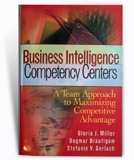| |||||
• polskie
• Zamów informacje o nowościach z wybranego tematu • kontakt |
BUSINESS INTELLIGENCE COMPETENCY CENTERSMILLER G., BRAUTIGAM D., GERLACH S.wydawnictwo: WILEY, 2006, wydanie Icena netto: Business Intelligence Competency Centers: A Team Approach to Maximizing Competitive Advantage Transform data into action for competitive advantage "The knowledge assets of an organization are becoming increasingly important for
competitive advantage, and therefore, the way in which knowledge is created, renewed, and
communicated is critical. This book provides practical insights into how this may be
achieved through the establishment of a Business Intelligence Competency Centre and is a
valuable read for 'information professionals." "BI is more than technology and projects. BI must live in the organization - as a
BICC. This book helps to make BI tangible and understandable, bringing it to life." "This book is a must-read for planning and implementing your BICC. It is a
pragmatic guide that addresses a lot, if not all, of the questions you'll be asking
yourself. Don't miss out on getting a head start from the people who thought this through
from start to finish... Pray your competitors don't get hold of this book!" "Creating a BICC forces the organization to focus on the importance of
centralizing the gathering, interpreting, and analyzing of information to create business
insight." "BI is a highly visible element in the 'business value' trend for IT investments.
Initiatives, such as competency centers, should empower user organizations to drive even
more value out of their BI investments." Gloria J. Miller, Vice President, Professional Services Division, SAS International, heads the international Professional Services Division at SAS, is the Executive Manager for the development of SAS Industry Intelligence Solutions, and is on the board of directors of SAS Global Services. Throughout her career of more than eighteen years in the information technology industry, Miller has received accolades for her skills in the management and delivery of IT systems and programs and in software development and support. She holds a master's degree in business administration from Bowie State University in Bowie, Maryland, and a bachelor of science degree from Augusta State University in Augusta, Georgia. Dagmar Bräutigam, Professional Services Program Manager, SAS International, has led the development of the Business Intelligence Competency Center Program and the Information Evolution Assessment Service. Based in Heidelberg, Germany, she is responsible for creating, developing, and rolling out SAS's education and consulting programs and services for the SAS Europe, Middle East, Africa, and Asia/Pacific regions. Bräutigam studied translation sciences in Heidelberg, London, and Geneva, and holds a degree from Ruprecht-Karls-University of Heidelberg. Dr. Stefanie V. Gerlach, Senior Program Consultant, SAS International, has extensive experience in developing training programs for project teams and business users. She developed the Business Intelligence Competency Center initiative for SAS and is responsible for the Business Intelligence Competency Center Services for the SAS Europe, Middle East, Africa, and Asia/Pacific regions. Gerlach has studied political science, history, and Protestant theology in Heidelberg and Paris, and holds a PhD in political science from Ruprecht-Karls-University of Heidelberg. Gerlach also codeveloped a manual that describes training methods and how to implement and manage computer training. SAS Institute (Cary, NC) is the market leader in providing a new generation of business intelligence software and services. SAS solutions are used at more than 40,000 sites, including ninety-six of the top 100 companies on the Fortune Global 500. SAS has customers in 110 countries. Table of Contents Foreword. Chapter 1: Introduction. Overview. Chapter 2: Business Intelligence in the Organization. Overview. Chapter 3: Primary Functions of the Business Intelligence Competency Center. Overview. Chapter 4: Planning a Business Intelligence Competency Center: Using the Information Evolution Model. Overview. Chapter 5: Human Capital. Overview. Chapter 6: Knowledge Processes. Overview. Chapter 7: Culture. Overview. Chapter 8: Infrastructure. Overview. Chapter 9: Setting Up and Ensuring Ongoing Support. Overview. Chapter 10: Cases from the Field. Insurance, South Africa: Mutual & Federal Defines Business Intelligence Strategy. Chapter 11: Ten Recommendations for a Highly Effective Business Intelligence Competency Center. Have a Vision for Business Intelligence. Appendix A: List of Abbreviations. Hardcover, 224 pages
Po otrzymaniu zamówienia poinformujemy pocztą e-mail lub telefonicznie, |


